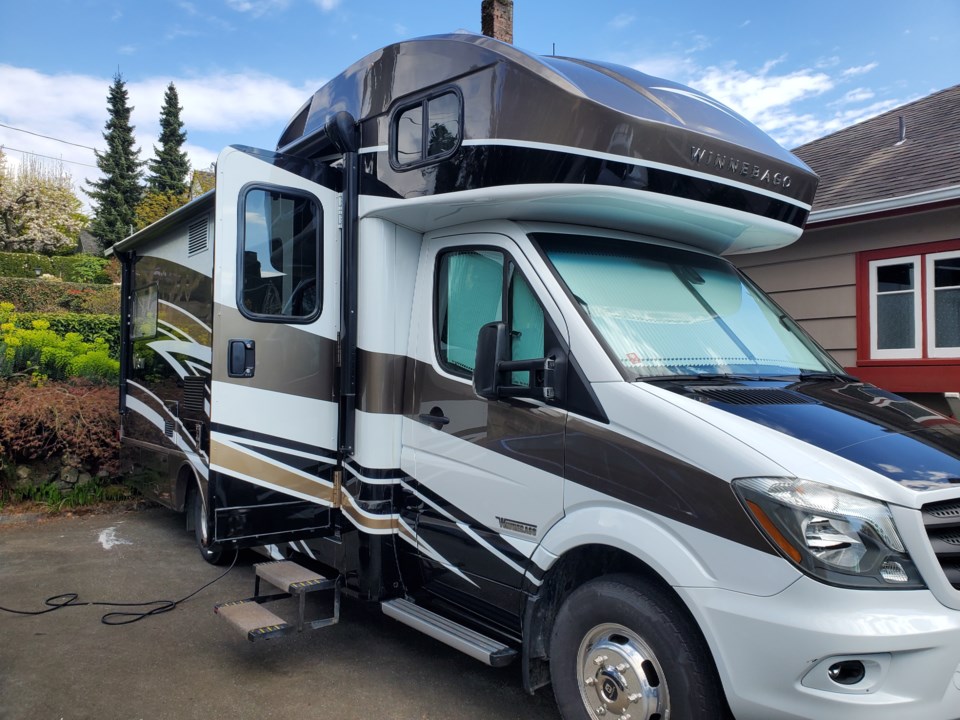Every day when Richard Lopez leaves work, he no longer goes home. Instead, he returns to an RV on his in-laws' driveway.
The seven-year waterworks employee with the City of Burnaby said he’s been living out of the RV, owned by his wife’s parents, for fear of unknowingly spreading COVID-19 to the one-bedroom apartment where his wife and daughter live.
Lopez hasn’t contracted the disease as far as he’s aware – rather, it’s his work that has left him concerned about his family. Specifically, Lopez said he’s concerned the city isn’t taking enough steps to ensure physical distancing in the workplace.
“It’s about two, three people per truck. … It will mean that we are within a foot, foot-and-a-half, two feet at the most (from one another),” he said.
Spokesperson Chris Bryan noted the city has staggered shifts to reduce the number of people in the muster area at any given time. But Lopez said that hasn’t squared with the messaging he’s seen from the province.
“What kind of information do (they) have that we don’t have and we don’t get on the news? Because the news is telling us to stay away from everybody,” Lopez said.
“If somebody gets sick, we are all going down because, eventually, I have been in contact with everybody. I haven’t been touching and kissing, but we have been in contact with each other, like to have to provide tools for somebody, somebody needs my assistance or something.”
Bryan also said the city has reduced the number of people in trucks from three or four to a maximum of two people. And since the NOW’s interview with Lopez, Mayor Mike Hurley said the city has pushed to drop that to one person per vehicle.
“For the most part, they have managed to find a way to move them all into individual vehicles or else deliver them individually to the worksites in a bigger vehicle,” Hurley said. “That’s what I’ve been told has happened. And in any case where there’s no other option, they’re given proper protective equipment to wear.”
But Lopez’s wife, Christine, who originally contacted the NOW, said the masks – which are recommended to avoid unwittingly spreading COVID-19 – won’t be effective unless the city makes them mandatory.
“Those guys are not going to wear masks if not everyone’s wearing them; they’re just not going to. I can tell you that right now,” she said. “If it was mandatory, you have to wear a mask, they would probably do that.”
Bryan said the city has also prioritized “the most critical repairs, replacements and maintenance,” and the city is taking advantage of facility closures to do work that can be done in a safe, physically distant manner in those facilities.
But Lopez said that could be taken further – including having some staff on call just to respond to emerging issues to avoid unnecessary contact with other crews.
The matter came to a head when Lopez began living in the RV at his office parking lot. He said he was given a parking pass at first, along with the ability to plug in his RV to maintain a power supply.
Bryan told the NOW that can be done in a safe, physically distant manner that Lopez has always been able to stay at the parking lot, but Lopez said his parking there initially caused an issue.
He was eventually told in a recent meeting with his managers that he was allowed to stay in the parking lot, he said, but he wasn’t allowed to plug in. That didn’t work, he said, because it meant switching from the city’s electricity to a diesel motor, which would make a lot of noise for himself and people in the area and cost too much.
Hurley, who also received an email from the Lopez family, said he was at first concerned when he received that email. But when asked if he was comfortable with the pace at which the city introduced physical distancing measures for city employees, he wasn’t keen to second-guess things.
“You can always look back and second-guess things, … but I think we have done a very reasonable job of putting the protections out there as quickly as we could, given the circumstances that we’re all dealing with,” Hurley said.
“Overall, were we perfect? Absolutely not. I don’t think anything’s been perfect throughout this whole thing, but I think we have moved as quickly as we could, given the circumstances.”
Hurley added that he has heard concerns from staff during the pandemic over the city’s handling of physical distancing. But he said those concerns have since been addressed.
“I was going around to all the workplaces, talking to people as I went through, so I certainly heard some of the concerns. … But I know, for example, in one of the (city) works areas over here, it was dealt with right away while I was there,” he said, adding that the parks department had a number of concerns as well.
“But they were addressed, and I haven’t heard anything different from that since; I’m sure I would have.”



